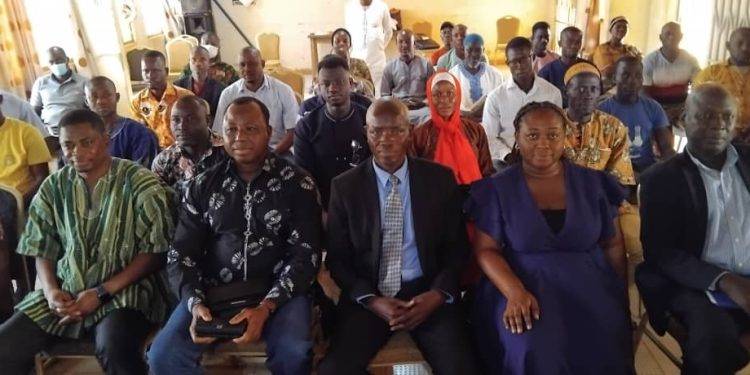Women, religious leaders, and advocacy groups in the Northern Region have urged Ghana’s incoming president, John Dramani Mahama, to promptly sign the long-awaited Anti-Witchcraft Bill into law. The call comes amid increasing concerns about the plight of women accused of witchcraft, many of whom face discrimination, violence, and banishment to remote camps.
The appeal was made during a stakeholder sensitization program held in Wulensi, Nanumba South District, under the auspices of the Commission on Human Rights and Administrative Justice (CHRAJ). The event was part of CHRAJ's Access to Justice initiative, aimed at raising awareness and fostering support for the legislation.
The bill, passed earlier this year as a Private Member’s Bill introduced by Francis Xavier Sosu, the Member of Parliament for Madina, is designed to criminalize harmful practices and protect individuals—especially women—from accusations of witchcraft. However, it awaits presidential assent to become law.
Persistent Issue of Witchcraft Accusations
Accusations of witchcraft remain a pressing issue in the Northern Region, where traditional beliefs and superstitions often result in severe human rights abuses. Women are frequently the primary targets, accused by soothsayers or community members of causing misfortune, illness, or death.
Accused women face brutal treatment, including beatings, banishment, and even lynching. Those who survive are often exiled to "witch camps," where living conditions are deplorable. There are currently six such camps in Ghana, located in areas such as Gnani in the Yendi Municipality, Kukuo in Nanumba South, and Gambaga in the North East Region.
At the Wulensi meeting, community members, leaders, and advocates highlighted the suffering endured by women in these camps. Many live without access to basic necessities like food, potable water, or proper shelter.
One participant, an assembly member from Kukuo, described the dire conditions in the camps, emphasizing the urgency of passing the bill to improve the lives of these women.
“Life in the camps is unbearable. There is little to eat, no proper shelter, and no access to clean water. These women are suffering greatly. We are appealing to the president, especially the incoming president, to urgently assent to this bill. It will provide the protection they desperately need and reduce their suffering.â€
Support from Religious Leaders
Religious leaders also lent their voices to the call for the bill’s enactment. A Reverend Father from Wulensi noted that many accusations stem from soothsaying practices, which often lead to mob actions against elderly women. He expressed optimism that the law, once enacted, would deter such behaviors and provide a legal framework for justice.
“The cause of many of these accusations is soothsaying, where someone is blamed for misfortune, and the community rises against them with sticks and machetes, driving them into camps. If this bill becomes law, it will help curb these practices and protect the vulnerable. We are appealing to the president to sign it into law.â€
CHRAJ’s Advocacy Efforts
Joseph Whittal, the CHRAJ Commissioner, outlined the commission’s ongoing efforts to combat witchcraft-related abuses and promote justice for affected women. He emphasized the importance of community involvement in implementing the law effectively once it is passed.
“This engagement aims to mobilize opinion leaders, chiefs, imams, pastors, and other stakeholders to appreciate the issues surrounding witchcraft accusations. If the bill becomes law, its success will depend on community buy-in and the willingness of people to report cases to law enforcement agencies,†he said.
Whittal expressed optimism that the incoming president would prioritize signing the bill, describing it as a critical step toward protecting vulnerable women and upholding human rights.
Broader Impact of the Legislation
Advocates believe that enacting the Anti-Witchcraft Bill will not only alleviate the suffering of women in witch camps but also challenge deeply rooted cultural norms that perpetuate such practices. By criminalizing accusations and related abuses, the law would send a strong message that these actions have no place in a modern, democratic society.
Stakeholders also see the bill as an opportunity to foster national dialogue on gender issues and human rights. They hope it will inspire broader reforms to address systemic discrimination against women and other marginalized groups.
A Plea for Urgent Action
The call for urgent action reflects the mounting frustration of those who have long advocated for change. For the women in witch camps, every day without legal protection is another day of suffering and indignity.
As Ghana prepares to transition to a new administration, the spotlight is on President-elect Mahama to take decisive action. The stakeholders’ message is clear: signing the Anti-Witchcraft Bill into law would be a historic step toward justice and equality for some of Ghana’s most vulnerable citizens.
With the voices of communities, religious leaders, and advocacy groups growing louder, the nation waits to see if this critical legislation will finally become a reality.




No comments yet
Be the first to share your thoughts!